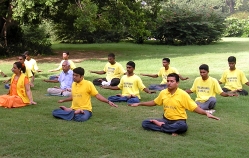Frequently Asked Questions

Practitioners meditate in a scenic spot in Delhi
- What's the difference between Falun Gong and Falun Dafa?
- Who practices Falun Dafa?
- Do you have to do it outdoors?
- Do I have to know Chinese?
- How much does it cost?
- How long does it take to learn?
- How long does it take to practice the exercises each day?
- Will this interfere with the practice of my religious beliefs?
- Can young children practice it?
- Why does the Falun Dafa symbol look like a swastika?
- Who is Mr. Li Hongzhi?
- Why is Mr. Li Hongzhi referred to as "Master"?
- Why is Falun Dafa persecuted in China?
Q: What's the difference between Falun Gong and Falun Dafa?
A: These are two names for the same practice. They can be used interchangeably. "Falun Gong" translates as "Practice of the Law Wheel" or "Law Wheel Qigong," while "Falun Dafa" translates as "Great Way of the Law Wheel."
Q: Who practices Falun Dafa?
A: People from all walks of life practice Falun Dafa, in over 80 countries, with the largest number being in mainland China. Ages range from toddlers to retired folks in their 90's. Practitioners include government officials, university professors, scientists, craftsmen, doctors, artists, actors, housewives, students, musicians and more.
Q: Do you have to do it outdoors?
A: No, though outdoor practice is encouraged. Falun Dafa exercises and meditation can be done anywhere, anytime.
Q: Do I have to know Chinese?
A: No, you don't. The teachings of Falun Dafa have been translated into thirty-some languages, and the instructions for its exercises are available in a number of languages or can be taught by a local volunteer.
Q: How much does it cost?
A: All Falun Dafa books are available to read online and download free of charge. They are also carried in many major libraries. All Falun Dafa workshops, exercise sessions, and related events are always free of charge.
Q: How long does it take to learn?
A: The exercises and meditation can be learned fairly well in an hour or two, and perfected over the course of about a week or so. The primary teachings, as set forth in the books Falun Gong and Zhuan Falun, can be read in several sittings. Mastery of these, of course, is a lifelong process of spiritual development.
Q: How long does it take to practice the exercises each day?
A: There is no set amount of time required for practice. The full session of exercise music, if one wishes to listen to it while practicing (which is recommended), is one hour for the four standing exercises, and one hour for the meditation. Shorter versions of each can be downloaded from the Internet. Regular, daily practice is of course best, but any amount that can be fit into a busy schedule will bring benefits.
Q: Will this interfere with the practice of my religious beliefs?
A: People of any faith tradition are welcome to learn Falun Dafa. Whether someone decides to focus exclusively on the practice of Falun Dafa at some point is always a personal choice.
Q: Can young children practice it?
A: Certainly. Many parents testify that Falun Dafa is a wonderful source of improvement in their child's life. Many children learn the exercises quickly and enjoy the sensations of energy and calm they bring; some parents relay that Falun Dafa is the first thing that got their child to sit still.
Q: Why does the Falun look like a swastika?
A: The swastika is an ancient symbol of good fortune embraced through the ages by cultures around the world. Swastikas have adorned Buddha statues for many centuries, long before the symbol was misappropriated and tragically associated with the horrors of the Holocaust. The symbol's true meaning is embodied in the Falun emblem. Learn more here.
Q: Who is Mr. Li Hongzhi?
A: Mr. Li Hongzhi is the founder and Master of Falun Dafa. He first taught the practice to the general public in 1992 in northeastern China in the city of Changchun. He is the recipient of numerous awards and citations for his efforts to promote human betterment. Mr. Li Hongzhi has been nominated for the Nobel Peace Prize and the Sakharov Prize For Freedom of Thought.
Q: Why is Mr. Li Hongzhi referred to as "Master"?
A: This is a common honorific in China for any accomplished instructor in any of a variety of skilled arts—such as the martial arts, Tai-chi, or qigong—or religious disciplines, such as Buddhism or Daoism.
Q: Why is Falun Dafa persecuted in China?
A: The complex rationale behind the persecution can be broken into four elements: a paranoid dictator's fear of Falun Gong's meteoric growth and soaring popularity; that same dictator's intense jealousy of Falun Dafa's popularity; the inherent conflict between the communist regime's savage political ideology and its polar opposite—Falun Dafa's principles of "Truthfulness, Benevolence, Forbearance"; and the very nature of communism, which to sustain itself requires periodically labeling a small segment of the population as the "class enemy" to "struggle" against. Learn more on faluninfo.net.